How to stop cousonelly.com from delivering notifications
AdwareAlso Known As: Ads by cousonelly.com
Get free scan and check if your device is infected.
Remove it nowTo use full-featured product, you have to purchase a license for Combo Cleaner. Seven days free trial available. Combo Cleaner is owned and operated by RCS LT, the parent company of PCRisk.com.
What kind of page is cousonelly[.]com?
While inspecting cousonelly[.]com, we learned that the purpose of this page is to trick visitors into allowing it to show notifications. It displays deceptive content to get that permission.
Our team discovered cousonelly[.]com while examining websites that use rogue advertising networks (illegal movie streaming pages, torrent sites, and similar pages).
![cousonelly[.]com ads](/images/stories/screenshots202209/cousonelly-com-ads-main.jpg)
Cousonelly[.]com in detail
Cousonelly[.]com uses a clickbait technique to trick visitors into agreeing to receive notifications. It instructs visitors to click the "Allow" button to prove that they are not robots (to solve a fake CAPTCHA). Pages like cousonelly[.]com usually show notifications that promote other potentially malicious websites.
After analyzing numerous notifications delivered by pages like cousonelly[.]com, we learned that most of them promote various technical support scams, phishing pages, shady apps, etc. It is common for these notifications to be disguised as warnings/alerts or notifications from legitimate apps and pages, etc.
In addition to delivering untrustworthy notifications, pages like cousonelly[.]com can open other websites designed to trick visitors into clicking the "Allow" button. It is important to mention that notifications shown by such pages can promote malicious websites.
| Name | Ads by cousonelly.com |
| Threat Type | Push notifications ads, Unwanted ads, Pop-up ads |
| Detection Names | Netcraft (Malicious), Full List of Detections (VirusTotal) |
| Serving IP Address | 172.67.196.166 |
| Symptoms | Seeing advertisements not originating from the sites you are browsing. Intrusive pop-up ads. Decreased Internet browsing speed. |
| Distribution Methods | Deceptive pop-up ads, false claims within visited websites, unwanted applications (adware) |
| Damage | Decreased computer performance, browser tracking - privacy issues, possible additional malware infections. |
| Malware Removal (Windows) |
To eliminate possible malware infections, scan your computer with legitimate antivirus software. Our security researchers recommend using Combo Cleaner. Download Combo CleanerTo use full-featured product, you have to purchase a license for Combo Cleaner. 7 days free trial available. Combo Cleaner is owned and operated by RCS LT, the parent company of PCRisk.com. |
Websites of this type in general
The main similarity between these pages is that they all display deceptive content to trick visitors into allowing them to show notifications. Typically, users open these pages inadvertently (by clicking deceptive ads and visiting untrustworthy pages). Sometimes, these pages get opened by installed adware.
Examples of similar sites are smartopc[.]xyz, ourwowspot[.]com, and stream-trust[.]xyz.
How did cousonelly[.]com gain permission to deliver spam notifications?
Pages are allowed to show notifications by clicking the "Allow" button when a browser notifies visitors that pages want to show notifications. Websites cannot show notifications without permission. Typically, pages like cousonelly[.]com use clickbait techniques to trick unsuspecting users into clicking the "Allow" button.
How to prevent deceptive sites from delivering spam notifications?
Click the "Block", "Block Notifications", or a similar button (depending on the web browser) to decline requests to show notifications or close suspicious pages before that. Do not click the "Allow" button while visiting questionable sites.
Note that trustworthy websites never claim that visitors must click the "Allow" button to prove that they are not robots, download files, play videos, etc. If you are receiving unwanted notifications, we recommend running a scan with Combo Cleaner Antivirus for Windows to automatically eliminate them.
Appearance of cousonelly[.]com website (GIF):
![cousonelly[.]com website appearance (GIF)](/images/stories/screenshots202209/cousonelly-com-ads-appearance.gif)
Video showing how to eliminate ads delivered by cousonelly[.]com using Combo Cleaner:
Instant automatic malware removal:
Manual threat removal might be a lengthy and complicated process that requires advanced IT skills. Combo Cleaner is a professional automatic malware removal tool that is recommended to get rid of malware. Download it by clicking the button below:
DOWNLOAD Combo CleanerBy downloading any software listed on this website you agree to our Privacy Policy and Terms of Use. To use full-featured product, you have to purchase a license for Combo Cleaner. 7 days free trial available. Combo Cleaner is owned and operated by RCS LT, the parent company of PCRisk.com.
Quick menu:
- What is Ads by cousonelly.com?
- STEP 1. Remove spam notifications from Google Chrome
- STEP 2. Remove spam notifications from Google Chrome (Android)
- STEP 3. Remove spam notifications from Mozilla Firefox
- STEP 4. Remove spam notifications from Microsoft Edge
- STEP 5. Remove spam notifications from Safari (macOS)
Disable unwanted browser notifications:
Video showing how to disable web browser notifications:
 Remove spam notifications from Google Chrome:
Remove spam notifications from Google Chrome:
Click the Menu button (three dots) on the right upper corner of the screen and select "Settings". In the opened window select "Privacy and security", then click on "Site Settings" and choose "Notifications".
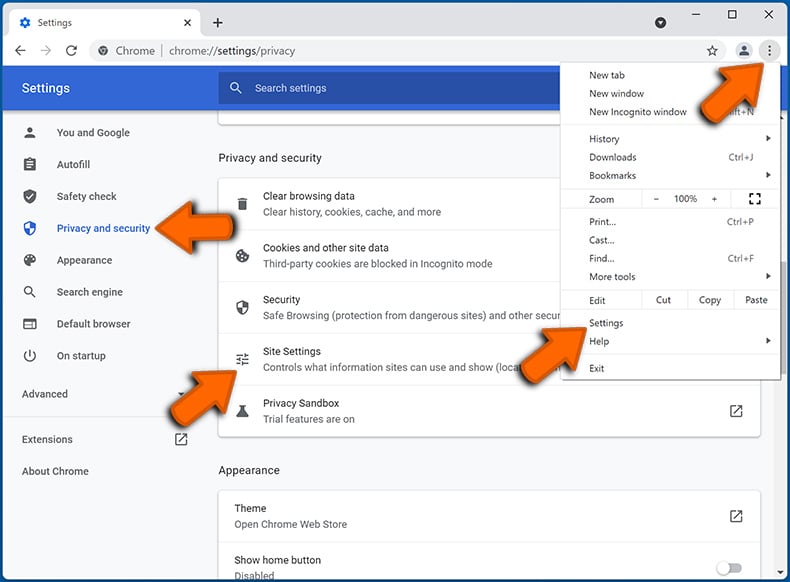
In the "Allowed to send notifications" list search for websites that you want to stop receiving notifications from. Click on the three dots icon near the website URL and click "Block" or "Remove" (if you click "Remove" and visit the malicious site once more, it will ask to enable notifications again).
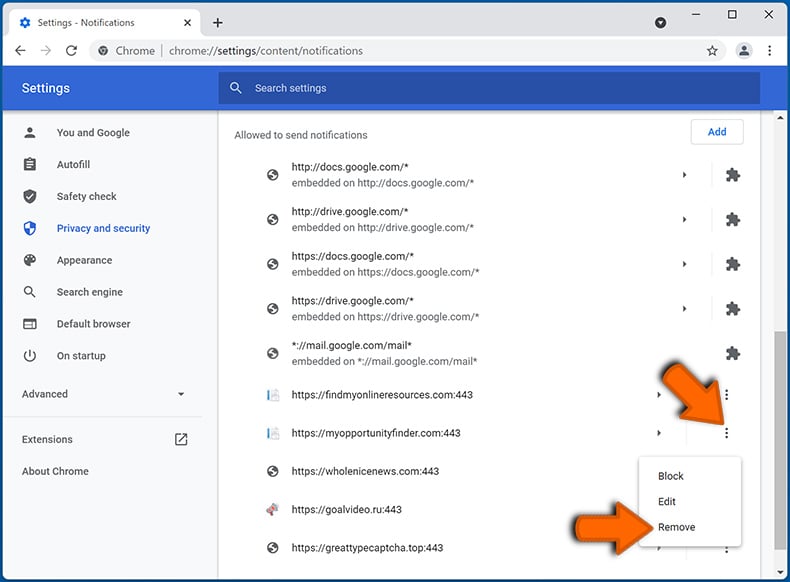
 Remove spam notifications from Google Chrome (Android):
Remove spam notifications from Google Chrome (Android):
Tap the Menu button (three dots) on the right upper corner of the screen and select "Settings". Scroll down, tap on "Site settings" and then "Notifications".
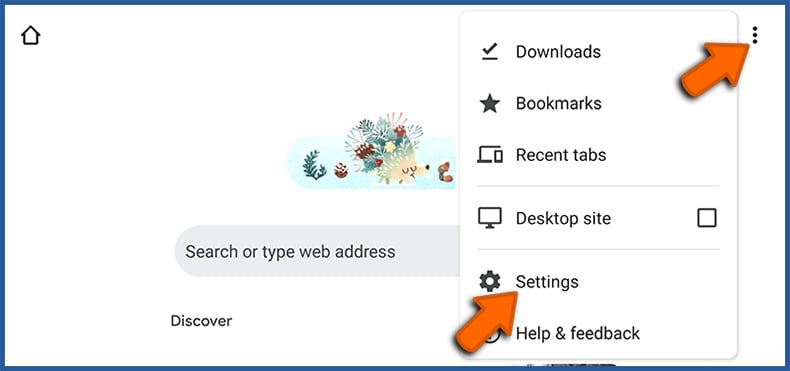
In the opened window, locate all suspicious URLs and tap on them one-by-one. Once the pop-up shows up, select either "Block" or "Remove" (if you tap "Remove" and visit the malicious site once more, it will ask to enable notifications again).
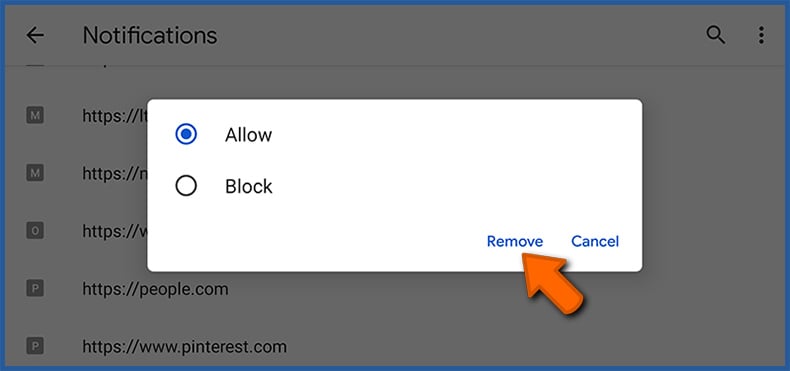
 Remove spam notifications from Mozilla Firefox:
Remove spam notifications from Mozilla Firefox:
Click the Menu button (three bars) on the right upper corner of the screen. Select "Settings" and click on "Privacy & Security" in the toolbar on the left hand side of the screen. Scroll down to the "Permissions" section and click the "Settings" button next to "Notifications".
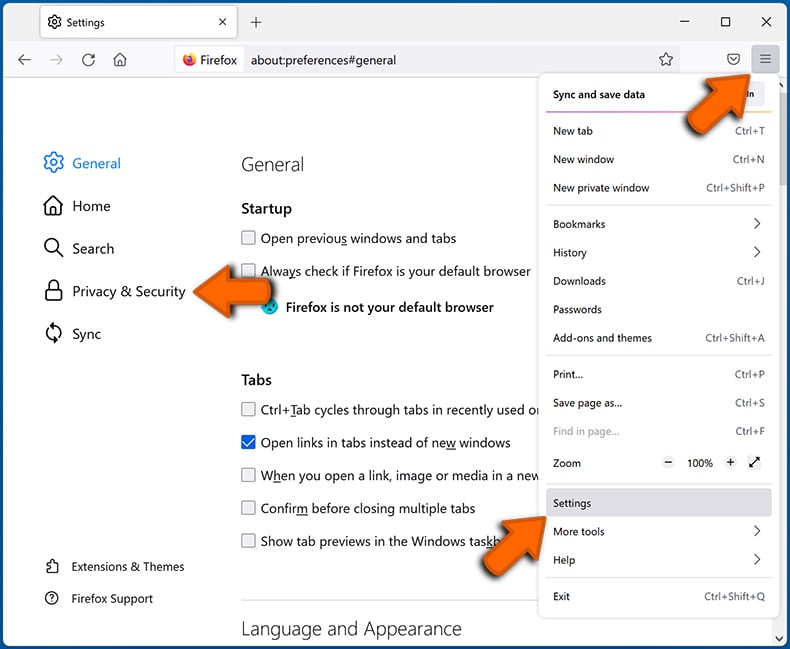
In the opened window, locate all suspicious URLs and block them using the drop-down menu or either remove them by clicking "Remove Website" at the bottom of the window (if you click "Remove Website" and visit the malicious site once more, it will ask to enable notifications again).
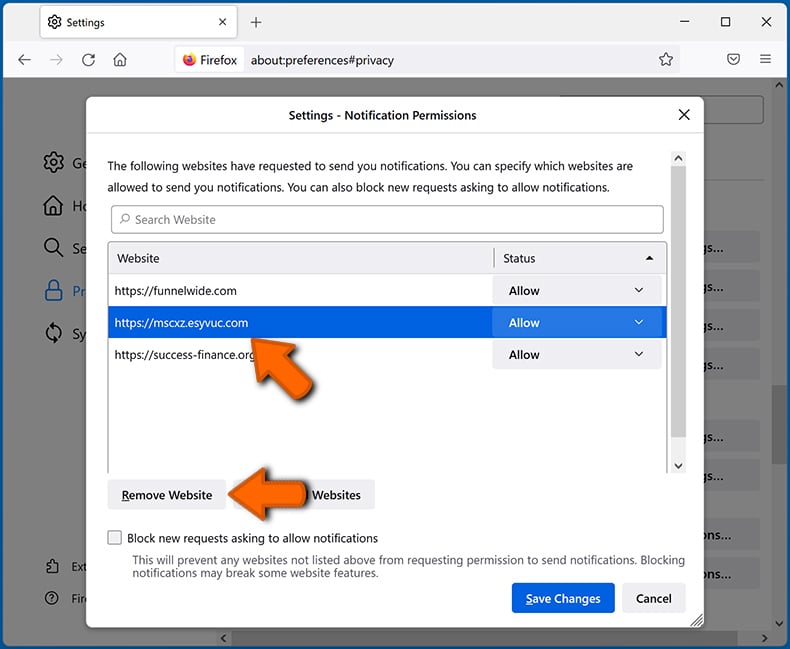
 Remove spam notifications from Microsoft Edge:
Remove spam notifications from Microsoft Edge:
Click the menu button (three dots) on the right upper corner of the Edge window and select "Settings". Click on "Cookies and site permissions" in the toolbar on the left hand side of the screen and select "Notifications".
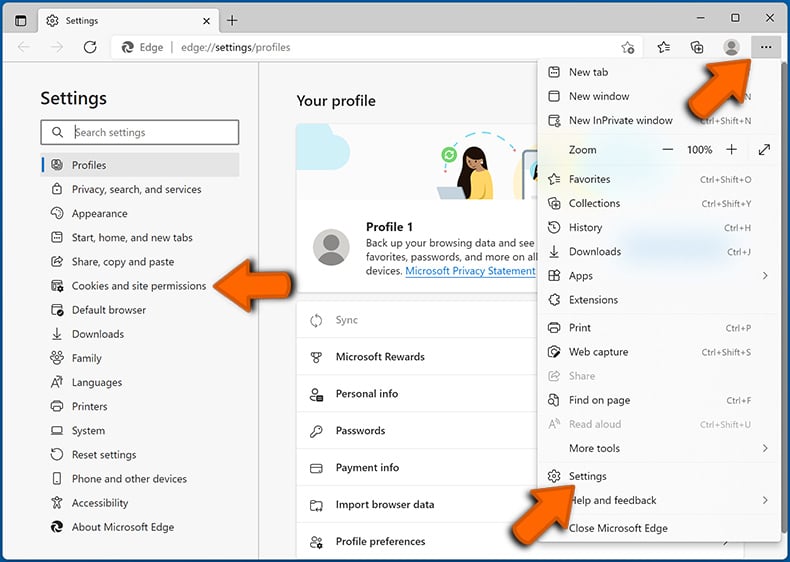
Click three dots on the right hand side of each suspicious URL under "Allow" section and click "Block" or "Remove" (if you click "Remove" and visit the malicious site once more, it will ask to enable notifications again).
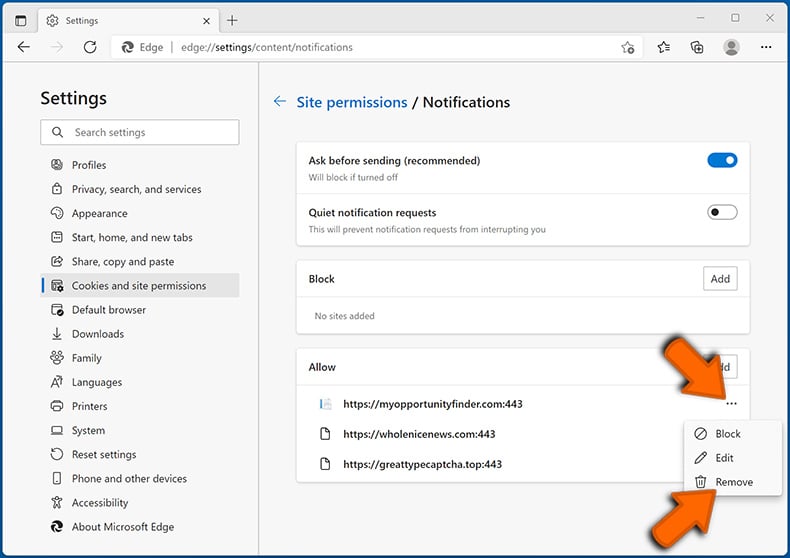
 Remove spam notifications from Safari (macOS):
Remove spam notifications from Safari (macOS):
Click "Safari" button on the left upper corner of the screen and select "Preferences...". Select the "Websites" tab and then select "Notifications" section on the left pane.
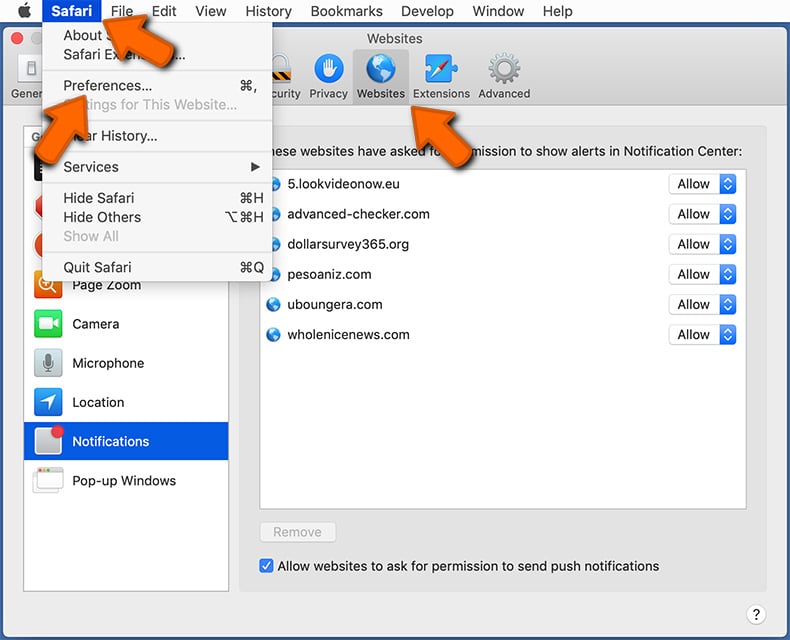
Check for suspicious URLs and apply the "Deny" option using the drop-down menu or either remove them by clicking "Remove" at the bottom of the window (if you click "Remove" and visit the malicious site once more, it will ask to enable notifications again)
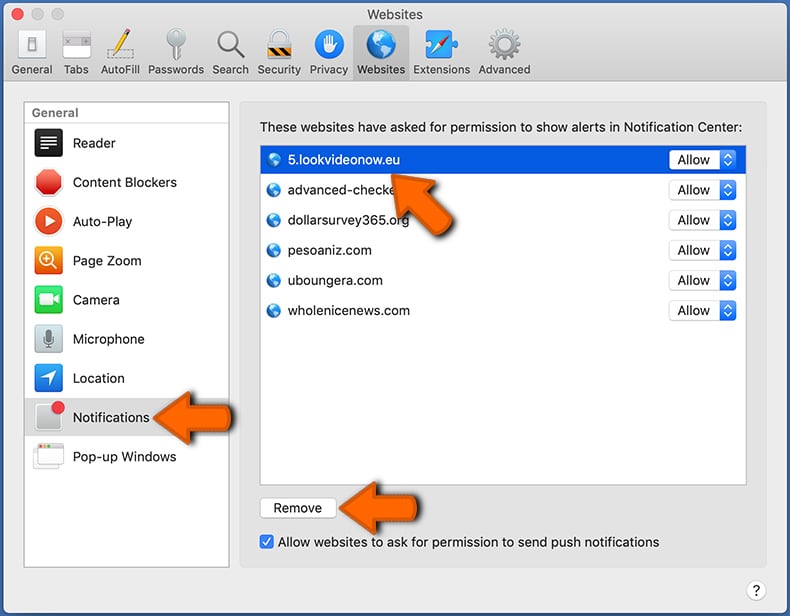
How to avoid browser notification spam?
Internet users should be very skeptical when being asked to allow notifications. While this is a useful feature that allows you to receive timely news from websites you like, deceptive marketers frequently abuse it.
Only allow notifications from websites that you fully trust. For added security - use an anti-malware application with a real-time web browsing monitor to block shady websites that tries to trick you into allowing spam notifications. We recommend using Combo Cleaner Antivirus for Windows.
Frequently Asked Questions (FAQ)
Why am I seeing ads (browser notifications) delivered by cousonelly[.]com in the right lower corner of my desktop?
If a website delivers notifications, it means that it has been allowed to do so. Permission for pages (in this case, cousonelly[.]com) is granted by clicking the "Allow" button in a displayed pop-up window while visiting them.
I have clicked on notification ads, is my computer infected?
Clicking on a notification is harmless. However, websites opened by such notifications can be malicious.
Is cousonelly[.]com a virus?
Websites like cousonelly[.]com are not viruses. Usually, they promote other untrustworthy pages (e.g., phishing sites, technical support scams) and applications.
Will Combo Cleaner remove cousonelly[.]com ads automatically or manual steps are still required?
Yes, Combo Cleaner will scan your computer and eliminate all permissions granted for cousonelly[.]com. It will also block further access to cousonelly[.]com. No additional steps will be required.
Share:

Tomas Meskauskas
Expert security researcher, professional malware analyst
I am passionate about computer security and technology. I have an experience of over 10 years working in various companies related to computer technical issue solving and Internet security. I have been working as an author and editor for pcrisk.com since 2010. Follow me on Twitter and LinkedIn to stay informed about the latest online security threats.
PCrisk security portal is brought by a company RCS LT.
Joined forces of security researchers help educate computer users about the latest online security threats. More information about the company RCS LT.
Our malware removal guides are free. However, if you want to support us you can send us a donation.
DonatePCrisk security portal is brought by a company RCS LT.
Joined forces of security researchers help educate computer users about the latest online security threats. More information about the company RCS LT.
Our malware removal guides are free. However, if you want to support us you can send us a donation.
Donate
▼ Show Discussion